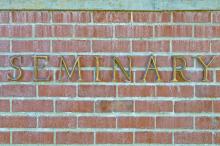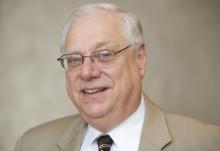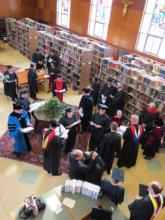Seminary

General Theological Seminary’s campus in the Chelsea neighborhood of Manhattan is everything you’d want in an urban seminary.
Handsome buildings, a chapel at the center, quiet walkways in a noisy city, calm places to read and pray. All serving a wonderfully diverse student body eager to minister in a changing world.
It’s like the best of historic church properties: harking back to a day of noble architecture and tradition and yet looking outward to a frenetic city and changing religious environment.
Why, then, is GTS on the verge of financial collapse and, now, paralyzing internal conflict? Its dean is under attack, 80 percent of its full-time faculty were dismissed, its board is floundering — all in the glare of press and blogosphere.
Why? For the same reason that historic churches and denominations are trapped in “train wrecks.” Their time has passed.

Several faculty members at the Episcopal Church’s oldest seminary are battling with the school’s leadership, although neither side agrees whether they quit, were fired or staged a walkout.
General Theological Seminary in Manhattan is the only seminary overseen by the national church. Last week, eight faculty decided to stop teaching classes, attending official seminary meetings or attending chapel services until they could sit down with the Board of Trustees.
The dean and president, Kurt Dunkle, wrote a letter to students saying the Board of Trustees’ accepted the eight faculty members’ resignations. But faculty member Andrew Irving wrote to students saying the professors never suggested they would resign.
“We wish to underline that we have not resigned,” Irving wrote, suggesting the group sought legal counsel. “Our letters did not say that we would resign. We requested meetings with the Board.”
The Rev. Ellen Tillotson, an Episcopal priest in Connecticut and a GTS board member, wrote that it has become clear that the eight faculty have been planning a walkout.

Redeemer Presbyterian Church, one of the most influential evangelical churches in the country led by author and speaker Tim Keller, has partnered with a Mississippi-based school to form a seminary campus in New York City in 2015.
The partnership between Redeemer and Reformed Theological Seminary fits in with the desire of evangelicals to plant their flag in large cities such as New York. It also reflects the influence of Reformed theology on evangelical thinking, as well as the impact of megachurches on theological education.
And while many seminaries are still suffering declining revenues since the economic crisis of 2008, the model of building campuses in major cities has proved successful for the Mississippi flagship seminary.
Students in the New York City campus will be trained to start churches by pursuing a two-year master’s of arts degree in biblical studies at $430-450 per credit hour before receiving another year of pastoral church planting education from Redeemer. The campus will likely launch in Redeemer’s offices near Herald Square in Manhattan.

Editor's Note: This is the final piece in a three-part series on Financing Seminary Education. Read Part 1 here and Part 2 here.
“The higher education industry is facing a multi-pronged and existential threat composed of successive waves of disruptive innovation” (Butler, “Tottering Ivory Towers,” American Interest (Sept/Oct). It seems higher education, including seminary education, is going the way of the music and media industries! Our 2,000-year-old business model of “sage on stage” could be truly doomed. The appearance of “massive open online courses” (MOOCs) over the past few years has thrown many higher education institutions for a loop, and more innovations are on the way.
In response to these new innovations higher-ed institutions, including seminaries, have tweaked their business models with a few technological modifications such as PowerPoint, email, electronic research, and online courses. But, will it be enough? Butler says “no” and so do the trends. The reality is graduates of today’s higher-ed institutions are not evidencing the competencies expected and/or hoped for by their future employers. Consequently, accreditation standards, at an all-time high in complexity, are now beginning to be challenged. Simultaneously, tuitions are costly, the economy is tough, and the job market is even tougher. The end result is that students are graduating with large amounts of student loan debt and potential students are opting out of the education market.
We began the 21st century with denominations and churches that no longer fit the needs of a shifting society, a Congress that votes against the poor and the middle class, and seminaries that face multi-pronged threats to their existence. It’s time for an overhaul!

Author’s Note: Institutions we have valued for generations are dwindling and falling by the wayside because we no longer have the finances to sustain them. In this second essay on financing seminary education (read the first HERE), I will address the socio-political and economic concerns that add to the complexity of the current crisis in theological education.
Democracy is based on the ideal of political equality. Each citizen is to have the same potential to influence what government does regardless of financial status. Markets, on the other hand, are directly related to real dollars. The consequent result for the U.S. democratic capitalistic structure is that while the rich and the poor are equal politically, they will never be equal economically. This combination could lead to two undesirable extremes: 1) mob rule by asset-less democratic majorities, or 2) oligarchic rule by the affluent. Thus, government’s role is to oversee the enterprise through the creation of regulatory policies that prevent runaway markets and taxation that assures a sustainable distribution of wealth and resources for the whole population. In order to achieve these goals, political theorists have developed models that focus on creating and sustaining a strong middle class with the result that the median voter will correct rising inequality in wealth as well as poor economic performance.

I eat, sleep, and breathe faith and politics; it is my passion and calling. From 9-5 each weekday, I direct communications and advocacy for Sojourners, moving around Washington, D.C. for various meetings, engaging with reporters and the media, and planning advocacy strategies around pressing justice issues. Then I turn off my computer and walk out the door. But instead of going home, I’m usually off to another meeting that has little to do with politics and everything to do with faith.
I’m a bi-vocational pastor, and I spend 15-20 additional hours working in a local congregation alongside several clergy colleagues, who themselves are a mix of full-time and part-time ministers. Serving in a church keeps me rooted. It provides perspective when the dysfunctions of Washington threaten to consume me. Helping people discover faith and integrate it into their lives renews and enlivens my soul.
Part of me pretends that I’d be spending this much time worshiping on Sunday morning and hanging out with my fellow young adults anyway, so I might as well be polishing my ministerial skills. But when I’m honest, I know it isn’t close to the same thing. I am way more invested in people’s lives – their joys and concerns – and the life of a particular community than I otherwise would be as “just a member of the congregation.” It is a demanding role that can be emotional, mentally and spiritually draining at times, but I love every minute of it. This is what I was made to do. Being a pastor is my identity. This calling is fundamental to who I am and how I understand myself in the world.
The number of bi-vocational ministers is increasing rapidly. Many pastors who work full-time jobs and serve in congregations part-time receive little or no pay for their church service. This trend has been described as “the future of the church” and extolled because the model is a return to “the original church” that will “enliven congregations.”

Paul said, "the foolishness of the cross" not "the stable middle-class lifestyle," if you want my opinion on seminary education, the changing economy, and baptismal identity in general. We bear a responsibility to care for one another as Christians (and beyond) that we have abdicated to the persnickety "marketplace." It's time to talk about holy poverty again, I think.
I can hear my free church friends and colleagues now, "But we don't take a vow of poverty!" It's true. We don't. We remember this historical movement away from the monasteries and the cathedrals, the parish system and the state church. This is an issue of ecclesiology, no question. What I wonder, however, is if in our attempts to not fall into the traps of the past, we simply have settled on the marketplace as our model for ecclesiology. I assume we have.
My degree is a "professional degree," yet within its conceptual framework the notion that I am "professed" is easily lost. I am not called to earn, but to labor, to serve. My work is "worth" nothing. Instead, it is a response to a vocation that in many ways we all share. The wealth of the community affords me the opportunity to respond to that shared call in a particular way. I am not your employee. I am your pastor. I am poor. Any wealth I may posses comes directly from the pockets of others.

To the dying church,
I think I missed the moment. It was a pretty big moment, too. At least here in the United States, you were a force to be reckoned with until a few years ago. You helped form the fabric of our society. Pastors were well-respected people of authority. They built great big sanctuaries, and people wore respectable clothing on Sunday mornings. To be fair, you didn’t — and don’t now — always live up to the hype. Sometimes you hide your head in the ground when it’s time to stand up against racism and homophobia. You’re still not so sure about the equality of women. You sometimes sell out to political agendas.
But regardless of the good and the bad, the moment is now over, and you’re dying. Or that’s what they tell me. All that power and influence is fading away. It sounds like some churches are having trouble even keeping the lights on. I know I should mourn for you, but allow me a moment of self-pity here too. What, you thought it was all about you?
You see, I’ve been getting ready for a few years now. A bunch of us have. Some of us have grown up with you, and some of us have just met you recently, but we’re all lining up to serve you. Somehow we all have this nagging sense that we’re supposed to be with you in these days, so some of us went to seminary and some went to college to learn youth ministry. We went to conferences and gave up our evenings and weekends to church basements with committees and youth groups. We read books and studied Scripture and prayed and imagined the kingdom of God breaking into the world through you. They call us emerging leaders, and we had a lot of hopes for you.

I grew up in the days of the encyclopedia salesman. I clearly remember the day when a clean-cut well-dressed man knocked on our apartment door to sell the 26-volume World Book Encyclopedia.
We were recent immigrants and could not speak English fluently. We had few worldly possessions and the last thing we needed in our house was a 26-volume encyclopedia.
After the hour presentation during which we flipped through the volumes full of exciting information, my dad said no. The salesman looked sad and pitiful as he packed his sales kit. As he exited the door, he gave one last pitch and, suddenly, my dad changed his mind and we bought the whole set.
Either the salesman was good or my parents had this strong desire that their children needed to know “everything there is to know about the world.” Maybe it was a bit of both.
In 2014, long gone are those 26-volume encyclopedias that once filled the bookshelves of many of my childhood friends’ homes. Now we have everything that we need to know at our fingertips through iPads, computers, cell phones, or other gadgets.

Theological education has increasingly left brick-and-mortar schools and headed back to congregations and family homes as more seminarians study online.
“The old move — uproot your family, get a new job, move to the seminary — that model isn’t working for so many people today,” said Ronald Hawkins, vice provost at Liberty University, which has around 9,000 students in its online seminary.
“They are looking for a way to increase their biblical theological knowledge, to expand their ministry skills and to remain within the context of the ministry setting.”
Despite “huge” hesitancy to allow online theological degrees, online education is growing, said Daniel Aleshire, executive director of the Association of Theological Schools, the main accrediting body for more than 270 seminaries and graduate schools.

After decades of glum trends — fewer priests, fewer parishes — the Catholic Church in the United States has a new statistic to cheer: More men are now enrolled in graduate-level seminaries, the main pipeline to the priesthood, than in nearly two decades.
This year’s tally of 3,694 graduate theology students represents a 16 percent increase since 1995 and a 10 percent jump since 2005, according to Georgetown University’s Center for Applied Research in the Apostolate (CARA).
Seminary directors cite more encouragement from bishops and parishes, the draw of Pope Emeritus Benedict XVI and the social-justice-minded Pope Francis, and a growing sense that the church is past the corrosive impact of the sexual abuse crisis that exploded in 2002.
MY FIRST GUIDED tour of Indianapolis was with a real estate agent, crisscrossing the city in his gleaming black Lexus. He spoke as he drove, filling the air with phrases such as, “Now, this is a terrific neighborhood,” and “You’ll want to steer clear of that one over there.”
As you’d guess, he focused on amenities, or the lack of them: hip restaurants, nearby shopping, nice parks, great schools. Security and consumables, good neighborhoods and bad. A mental map of the city took shape as we drove.
My second tour, just a few days later, was quite different—so different that it changed my life. This time the guide was one of the faculty members at Christian Theological Seminary, the school where I had just been appointed president. She’d lived in the city for more than 20 years, and on her tour, consumables came up now and then, but they took a definite back seat to the creative, groundbreaking ministries going on around town.
Her remarks frequently echoed the real estate agent’s, but from an entirely different angle. She’d say, “Now, this is a low-income neighborhood and a food desert [a section of the city where nutritious, affordable food isn’t readily available]—and right there on the corner is the amazing little church that’s started an organic community garden ministry.” Then a few minutes later: “Now, this is a middle-income neighborhood—and there’s the mosque that’s making a tremendous difference through its youth program.” And so on.

Christianity can quickly devolve into caste systems, where faith communities are divided by the haves and the have-nots, the rich and the poor. Instead of unifying ourselves in Christ, we are dividing ourselves by how much money we can afford to spend.
How much money is required to be a Christian? Imagine how much money we’ve spent throughout our lifetime on “Christian” activities and products (not including tithing or mission-related donations) — now imagine if we gave this money to people who really needed it.
“Consumer Christianity” has turned our faith into a set of costs, and it’s becoming increasingly costly to maintain the Christian status quo. In John 2, the Bible tells the riveting story of Jesus entering the Temple and becoming furious at what He sees: vendors who have turned something holy into a commercial marketplace. Jesus is irate, and he basically tears the place apart because of their sin. But how different are our churches today?
MY WIFE IS a pastor. Specifically, she’s the senior pastor of a prominent church in downtown Portland, Ore. I’m on staff too, but only part-time, and she enjoys telling people she’s my boss. Technically, I answer to the church board, but people get a laugh about the reversal of “typical roles.”
I get my share of “preacher’s wife” jokes, to which I have a handful of rote responses. No, I don’t knit or make casseroles. No, I don’t play in the bell choir. Generally, the jokes are pretty gentle, but they all point to the reality that few of us will actually talk about: We see the traditional roles of women as less important than those of their male counterparts. And so, to see a man who works from home most of the time and takes the kids to school while his wife has the “high power” job brings everything from the man’s masculinity to his ambition into question.
But regardless of the teasing I get, Amy has it a lot worse. One time, when she was guest preaching at a church in Colorado, a tall man who appeared to be in his 60s came up to her after worship. “That was pretty good,” he said, smiling but not extending his hand, “for a girl.”
Amy and I planted a church in southern Colorado 10 years ago, and we actually kind of enjoyed watching people’s expectations get turned on end when they met us. A newcomer would walk in the doors of the church and almost always walk up to me and start asking questions about our congregation.
“Oh, you’re looking for the person in charge,” I’d say. “She’s over there.” Then would come the dropped jaws and the wordless stammers as they reconfigure everything they assumed walking through the door. Amy’s even had people stand up and walk out in the middle of worship when they realize she’s about to preach.

It was December of 2000, but I remember the occasion as if it were yesterday.
It was a few days after Christmas during my senior year of college. I was quite nervous, and I wondered how my friends and family would react.
How would my basketball teammates respond? Would my roommates treat me differently? And of course, what about my girlfriend? She had no idea our relationship would take such a dramatic turn.
I could hide no longer. I had to be honest with who I was. And so, after a great deal of delay and long nights of nervous planning, I finally decided to share what I had been keeping secret.
Beginning with my girlfriend, then my parents, brother, sister, and eventually friends, roommates, and teammates, I shared the news: After a significant amount of prayer and discernment, I was no longer planning to attend law school following college graduation, but instead, I wanted to attend seminary in order to become an ordained Lutheran pastor.
As to be expected, I received mixed reactions.
My parents were confused and surprised, as they – like most people – had not perceived me as “religious”," especially not to the point of pursuing ordination. Nevertheless, they accepted the news with delight and affirmation.
In addition, my girlfriend (who is now my wife) was wonderfully supportive. So was my brother, sister, and closest friends.
On the other hand, some others were not sure how to react. My friends – mostly uninterested in religion – wondered about future plans. Basketball teammates were a bit uneasy. And even the campus priest and a few professors had an assortment of reactions. While a number of people were anxious and apprehensive, those within my closest circle of friends accepted the announcement with open arms.
I continue to thank God for such a wonderful web of support.

A professor who was fired in July by the Interdenominational Theological Center says the Atlanta consortium of black seminaries discriminated against his conservative Christian views.
The Rev. Jamal-Dominique Hopkins, an African-American expert on the Dead Sea Scrolls, filed a complaint with the Equal Employment Opportunity Commission in July. He accused ITC administrators of harassment that included “disagreeing with my conservative religious ideals, intimidating me, slandering my character, giving me poor evaluations, and changing student grades from failing to passing with no merit.’’
Hopkins, 42, told Religion News Service that tensions arose after a speaker from InterVarsity Christian Fellowship addressed an informal session he organized in February. During the session, attendees were offered a book that declared homosexuality was a sin.
He said his department chair, the Rev. Margaret Aymer, questioned the distribution of the book and threatened his job.

Ron Paul Defends The 99 Percent: ‘It’s A Very Healthy Movement’; SWAT Raids, Stun Guns, And Pepper Spray: Why The Government Is Ramping Up The Use Of Force; GOP Needs To Address Immigration In A 'Humane' Way; Gap Between Rich And Poor Widening Across The Developed World, As Bankers And Executives Reap More Income; Challenges At The Cutting Edge Of Fighting Global Poverty; Baby Boomers Heading Back To Seminary; Worst Year Ever For Greenhouse Gases.
Seminaries train pastors on how to read the Bible. But those tools often don't reach people in the pews.
What was most telling about the disagreement between the two men was their discussion of Luke 4. Mohler argued the passage should be understood in light of how he interpreted the preaching and teaching of Paul and the other apostles. This means that when Jesus said that he came to bring good news to the poor that good news was personal salvation.
Wallis argued that yes, personal salvation is one part of that good news, but that the other part is the Kingdom of God breaking into the world and transforming societal relationships as well. When the Gospel is proclaimed, it is good news for a poor person's entire being, community and world -- not just his or her soul.
First, it was encouraging to hear Mohler spend a lot of time emphasizing that working for justice is essential to fulfillment of the Great Commission. Throughout the night he repeated his concern that a lot of Churches are REALLY bad at making disciples who actually do the things Jesus told us to do. As the president of one of the largest seminaries in the world, it will be interesting to see if he is able to train a generation of pastors who will do things differently. My concern is that he is missing the connection between his theology and the failure of Christians to actually do justice.
If justice is only an implication, it can easily become optional and, especially in privileged churches, non-existent. In the New Testament, conversion happens in two movements: Repentance and following. Belief and obedience. Salvation and justice. Faith and discipleship.
Atonement-only theology and its churches are in most serious jeopardy of missing the vision of justice at the heart of the kingdom of God. The atonement-only gospel is simply too small, too narrow, too bifurcated, and ultimately too private.